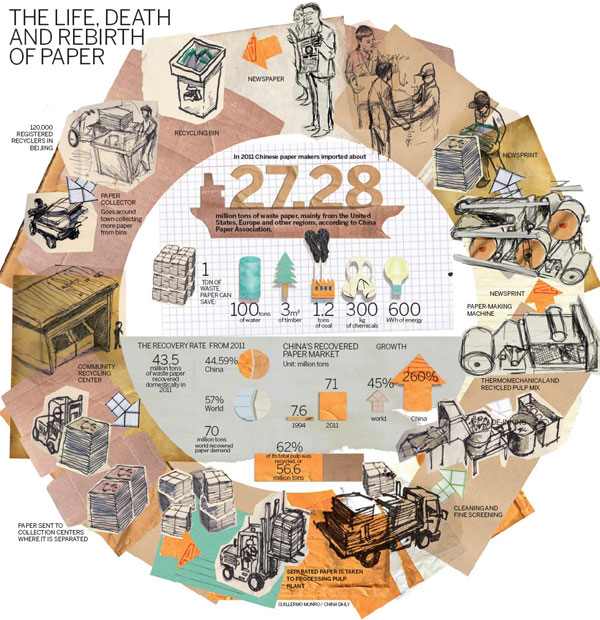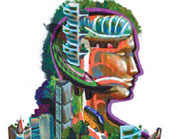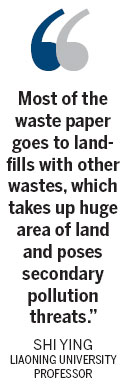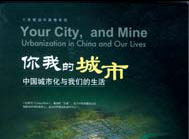Carbon footprint
Updated: 2013-01-16 10:20
By Liu Xiangrui (China Daily)
|
|||||||||||

If each of us makes a little more effort to sort out our garbage, there will be less waste and more recycled items with better quality. Liu Xiangrui digs deep into the trash heap.
While most people casually throw sales slips and little paper wrappers away, Chen Liwen feels disheartened when she sees such acts.
Related: When paper saves the earth
"Small paper pieces are easily neglected. But they make a big difference when you add them up," explains Chen, 30, who works for an environmental NGO in Beijing. "If you ask recyclers, they will tell you the pieces of paper can be recycled as long as they are clean."
To save resources and reduce environmental damage, Chen pays attention to the smallest details. For example, she would clean paper bags used for bread and give them to recyclers.
|
 |
A survey by the China Paper Association finds that in 2010, China consumed more than 91 million tons of paper products, which means an average individual consumption of 68 kilograms.
The consumption amount grew by 10 percent per year between 2000 and 2010. But because of inefficient recycling, more than half of used paper is wasted in China.
In 2011, China had recovered 43.5 million tons of waste paper, amounting to a recovery rate of about 45 percent - 12 percent lower than the world's average.
Paper is one of the commonest wastes.
Shi Ying, a professor from Liaoning University, who has long been a domestic garbage treatment observer, calls it "a treasure placed in the wrong place".
Most papers are recyclable, from old newspapers to magazines, books, office paper, posters, paper cartons and wrappers. In general, paper can be recycled up to seven times.
A ton of recycled paper can be used to produce another 800 kilograms of paper, saving three cubic meters of timber.
Recycling waste paper is also about subtraction, such as saving energy, reducing greenhouse gas emissions, and keeping landfill space free for other trash that can't be recycled.
 |
Compared with virgin fiber, a ton of waste paper can save 100 tons of water, 300 kg of chemical material, 1.2 tons of coal and 600 kWh of energy in paper making.
Many environmentalists have sought to turn more waste paper into resources and reduce pollution through domestic garbage classification.
According to Shi, most Chinese cities treat domestic waste the traditional way - through incineration and landfills.
"Under such a system, parts of paper wastes are incinerated, resulting in loss of resources and air pollution. Most of the waste paper goes to landfills with other wastes, which takes up huge areas of land and poses secondary pollution threats," she says.

Chen started sorting out her garbage when she rented her own place four years ago. "I felt the need to take action after I learned about the problems. Reducing garbage and sorting wastes are the least I can do for the environment," she says.
She always separates kitchen wastes from other domestic wastes, most of which are paper and plastics. The kitchen wastes are thrown into garbage bins below her apartment, but Chen sends waste paper and other recyclables to recyclers nearby.
Chen and her colleagues have discovered that some recyclers are reluctant to take the small paper packages because they are often light and require a lot of space.
"So I'd give them away for free to get recyclers involved in our environment efforts," explains Chen, who classifies the recyclables before delivering them to recyclers.
Though some cities and communities have pilot garbage-sorting programs, environmental organizations find it difficult to involve the public in their green campaign.
Wu Daojie, head of a college students' society on environment in Guangzhou, started a program with other volunteers to help residents in a local community sort garbage last year.
The residents normally save bigger paper items - such as carton boxes, newspapers and magazines - either to sell them to recyclers or place them into the green garbage bins.
"But smaller stuff like slips of paper are usually ignored and thrown away as 'other wastes' instead," Wu explains.
He finds disparities among different age groups - the elderly usually do a better sorting job and are more willing to save the recyclables than middle-aged residents.
But he opines that generally, the public still lack in knowledge and awareness about waste sorting and recycling. "Some residents simply ignore our advice, while others explain that they don't know how to classify and don't want to take the trouble, either," Wu says.
 |
Chen, who collects wastes from door to door, finds less than 10 percent of residents regularly store recyclable wastes at home, and most people simply throw them away.
"Some don't care about the petty cash they get from waste recycling, while others just don't bother," the recycler explains.
He works up to 10 hours a day, and has to spend one or two hours sorting his collection before bringing it to different recycle centers.
"It will save me a lot of energy and time if people can sort the wastes beforehand," Chen says.
Contact the writer at liuxiangrui@chinadaily.com.
Related Stories
From fashion cycle to recycle 2012-07-02 09:23
From garbage to garments 2012-09-02 09:54
Tibetan herders lead environment effort 2012-08-16 14:46
Gisele Bundchen plants trees 2012-06-05 11:11
Today's Top News
Police continue manhunt for 2nd bombing suspect
H7N9 flu transmission studied
8% growth predicted for Q2
Nuke reactor gets foreign contract
First couple on Time's list of most influential
'Green' awareness levels drop in Beijing
Palace Museum spruces up
Trading channels 'need to broaden'
Hot Topics
Lunar probe , China growth forecasts, Emission rules get tougher, China seen through 'colored lens', International board,
Editor's Picks

|

|

|

|

|

|





